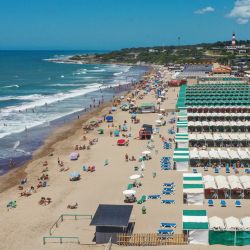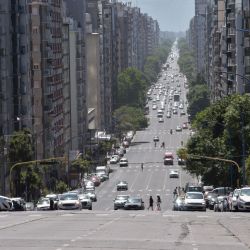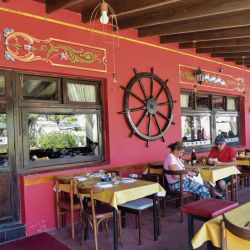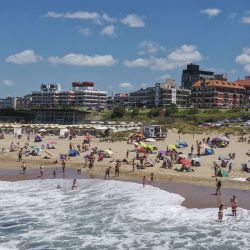They are few, tight-fisted and downcast. This year's trickle of vacationers to Mar del Plata is a dreary reflection of the country's economic woes.
With annual inflation of 211 percent and the prospect of further austerity under President Javier Milei, few can afford to let their hair down.
"One should be relaxed on vacation, not worrying. I don't mean spending without limits, just not having to crunch the numbers all the time," said beachgoer Julián Groppo, a 26-year-old architect who cut his usual 15-day trip to the popular Atlantic beach resort down to five this year.
"It makes me sad, actually," he laments, discussing his truncated vacation at the ‘Ciudad Feliz,’ (“Happy City”) as Mar del Plata is nicknamed.
On one of the beaches, groups of children and adults play football on the golden sand.
In a normal year, this would be impossible between the tens of thousands of bathers gathered over vast stretches of beach in the town, some 400 kilometres (about 250 miles) south of the capital Buenos Aires.
Most years, between Christmas and February, the seaside resort receives six times more tourists than its 650,000 permanent residents.
This summer, the city is half-empty. Occupancy was only at 60 percent in the first half of January, according to Mar Del Plata's hotel association.
At the bus terminal, out of 42 platforms, only three are occupied by long-distance transport.
Outside, the line of cabs waiting for passengers continues out into the street.
"Last summer, I did at least 30 trips a day. Now I'm happy if I get to 15," sighs taxi-driver Daniel Molina, one in a long line of idle cars awaiting customers near a bus stop.
"It's a lost season. Look at how it is,” he says, pointing to the quiet streets. “It's dead!"
Slow-going
With inflation hitting 211.4 percent in 2023, its highest since 1991, and Milei's more than 50-percent devaluation of the peso in December, going on holiday has become a luxury for those who could previously afford it.
Those who are there spend half their time going from store to store and restaurant to restaurant, checking prices.
Maria Aprile, a young illustrator from Buenos Aires, said she was only able to come to Mar del Plata this year because she shared the fuel costs with three friends and was holidaying "in my grandmother's apartment."
"If not for this, clearly I would not have come."
Many didn't. The minimum monthly wage of 156,000 pesos – equivalent to US$179 at the official exchange rate – has been awaiting an adjustment since December, falling ever further behind inflation.
A round bus trip from Buenos Aires to Mar del Plata costs about 80,000 pesos (US$92) and a mid-range hotel close to 50,000 pesos (US$57) per night. Dinner at a restaurant costs around 13,000 pesos (US$14) per person.
Valeria Pratto, a 45-year-old real-estate agent, said she had not made "even a quarter" of her 2023 vacation rentals this year.
And José María Mendiola, who rents small tents for bathers to shelter from the sun, said he was only renting out 50 to 60 percent of those available.
Another country
On the beaches, there’s a lot of sand to go around. Tourists take advantage of the unprecedented amounts of space and set up impromptu small football or paddle ball fields, scenes that would be impossible to see in previous summers.
Luciano Rodrigo, a specialist racehorse trainer, explains: "When there are a lot of people, you pass by here and the music from all the speakers gets mixed up with each other."
On the beaches today, however, you can hear the strong wind whipping along the coast.
Guido Salvaterra, who migrates from the capital every summer to sell grilled corn – a favourite beach snack – said he was used to families buying one ear per person, at about US$3.50 apiece.
"Now they all share one" ear.
Resort manager Paul Etcheverry told AFP vacationers this year were "angry."
"They don't come as long, they bring their own food, drinks, and don't go to restaurants as much."
Last week, Argentina's informal exchange rate reached a record of 1,225 pesos against the US dollar. The official rate is 868.80 pesos.
Inflation has caused a more than 20 percent drop in wages since December, according to the Central de Trabajadores de Argentina (CTA) trade union federation.
"Two months ago [Argentina] was one country. Today it is another," said the tent renter, Mendiola.
related news
by Martín Raschinsky, AFP



























Comments